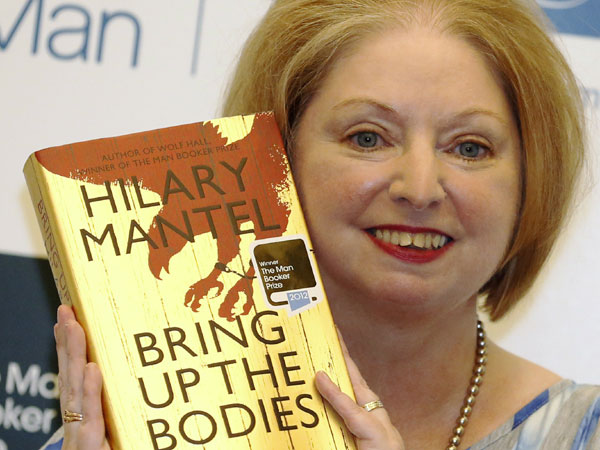Source: http://themanbookerprize.com/prize/man-booker-prize
The whittling has finished. The judges of this year's Man Booker Prize started with a daunting 145 novels and have winnowed, sifted, culled, and in some cases hurled, until there was only one left: Hilary Mantel's Bring up the Bodies.
Hers is a story unique in Man Booker history. She becomes only the third author, after Peter Carey and J.M. Coetzee, to win the prize twice, which puts her in the empyrean. But she is also the first to win with a sequel (Wolf Hall won in 2009) and the first to win with such a brief interlude between books. Her resuscitation of Thomas Cromwell – and with him the historical novel – is one of the great achievements of modern literature. There is the last volume of her trilogy still to come so her Man Booker tale may yet have a further chapter.
The writing will have to wait a bit though. She may have won before but the torrent of media interest will still knock her back as if she's been hit by a wave. In 2009 she confessed to feeling as though she were “flying through the air”, well, she's soaring again. When she lands she won't have time to think and she will talk into microphones until her throat is sore. It comes with the territory: everyone wants a bit of the Man Booker winner.
It has been a long and uniquely intense journey not just for her but for everyone associated with the prize. For the judges it has meant nine months of work, worry and pleasure. Their choices have been scrutinised and criticised and their thoughts and penchants imagined. They will have read the shortlisted books at least three times. They will await the public's verdict on their choice with sang froid mixed with curiosity. They needn't be worried, Bring Up the Bodies has had near universal praise from critics and reading public alike.
The shortlisted authors meanwhile have felt the hot brightness of the media spotlight on them since July when the long-list was first announced. They can breathe out now. For Hilary Mantel all those middle-of-the-night moments when she had to tell herself not to think of what it would be like to win again, not to jinx herself, can stop.
Indeed, spare a thought for the shortlisted authors; they will have had a day unlike any other they have known. How do you take your mind off the fact that in a matter of hours you might be the winner of arguably the world's most high-profile literary prize? Of course it is an honour and validation to be shortlisted but they will have known that at 11.30 this morning the judges closed the door of a room somewhere in London – possibly near to where they themselves were standing/shopping/chomping their nails – and settled down to decide their future. They will have wondered what that group literary holy men and women, like the conclave of cardinals in the Sistine Chapel choosing a new Pope, were talking about and wondered whether the puff of white smoke that finally emerged was for them. They may be writers but they're only human.
The nerves will have continued all through the prize dinner, even a phalanx of loved ones, publisher and agent can't keep them away. They chatted amicably, a drink – but perhaps just the one – to steady the beating heart. I doubt they tasted their food. Who would have wanted to be them as Sir Peter Stothard took to the rostrum and opened his mouth to enunciate the first syllable of the winner's name? She may qualify as an old hand but Hilary Mantel confessed that her nerves this time round were infinitely worse than in 2009.
This is not the end of the process, however. For Hilary Mantel it is the moment of coronation before she confronts the wider horizons that have suddenly opened up before her. For the other shortlisted authors who came so agonisingly close they have the knowledge that every publisher in the land will bite their hand off for the chance to publish their next book and that, whatever they write, they will have a wide and eager audience. Their names are now known to readers who may have had no idea of them only a few months ago.
Perhaps the real object of envy is not the winner – she thoroughly deserves her triumph – but the readers who have yet to open Bring Up the Bodies. They have just won a prize too.


No comments:
Post a Comment
Note: Only a member of this blog may post a comment.